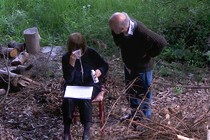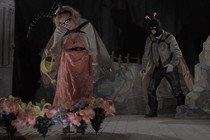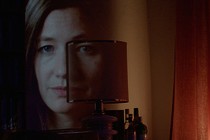Review: Mrs. Fang
- LOCARNO 2017: Chinese director Wang Bing gifts us the last moments of a farmer who has long been living with Alzheimer's disease

Chinese director Wang Bing, returns to Locarno Festival (after joining the jury for the International Competition last year) with a film filled with delicacy and despair. Co-produced with France and Germany, Mrs. Fang [+see also:
trailer
film profile] (International Competition) continues a discussion on the everyday people to whom Wang Bing feels intimate ties, tirelessly searching for the sublime that hides in the banality of everyday life.
In his latest film Wang Bing decided to film the last moments of Fang Xiuyan's life (Mrs. Fang precisely), a farmer born in Huzhou (Fujian) at the end of the 1940s and who has long been diagnosed with Alzheimer's disease. The director first met Mrs. Fang's daughter in 2014 and was invited to her mother's home the following year.
His encounter with the lady, who was by then already seriously unwell, deeply touched the director, not leaving her bedside since the moment he was informed about Mrs Fang's deteriorating health condition in 2016. Bing decided to turn her last breath into a form of poetry, giving a voice to people such as herself who lived life on the edge of a history that seems to have forgotten them.
Put in a corner, suffocated by an extremely conservative policy, the everyday lives depicted by Wang Bing take take little personal revenges through the screen, becoming, even if only for a moment, the protagonists of their own lives. It’s in this sense that Mrs. Fang becomes symbolic for an entire group of Chinese people who are the victims of a logic of confinement that pushes them into an increasingly narrow space.
Imprisoned, not just in terms of location (in her province, bedroom and bed), but also physically (her eyes are virtually the only part of the body that she can still move), Fang Xiuyan seems to assume the appearance of a fish gasping for air on the banks of the river that she witnessed come to life. The same fish that her children try regularly to catch, wrapped in the darkness of an almost surreal night, but that no one really has the courage to kill.
With an impressive series of shots that fix on the face of this ill woman at the limits of her endurance, Wang Bing enters the slow pace of the character's movements, staying true to her story. A truth that is certainly not addressed in the family discussion’s happening around her, but it’s a true is hiding in the depths of her body, in her desperate gaze, in those imperceptible movements that suddenly seem to be symbolic of an entire life lived. Wang Bing uses Mrs. Fang's last gestures to write a visual poem of rare intensity: both desperate and sublime.
Unable to express their pain in her last moments, Mrs. Fang's family, just like her, seem to internalise everything within, becoming treasure chests. Their tears, scarce and discrete, only come at the very end, like a light dew punctuating the beginning of a new day.
With Mrs. Fang, Wang Bing teaches us a great lesson, not only in terms of cinema, but also humanity, establishing himself once again as a true master of narrative reality.
Mrs. Fang was produced by the French outfit Idéale Audience , along with Hong Kong's Wil Productions and All Ways Pictures, co-produced with German Documenta 14.
(Translated from Italian)
Did you enjoy reading this article? Please subscribe to our newsletter to receive more stories like this directly in your inbox.


























